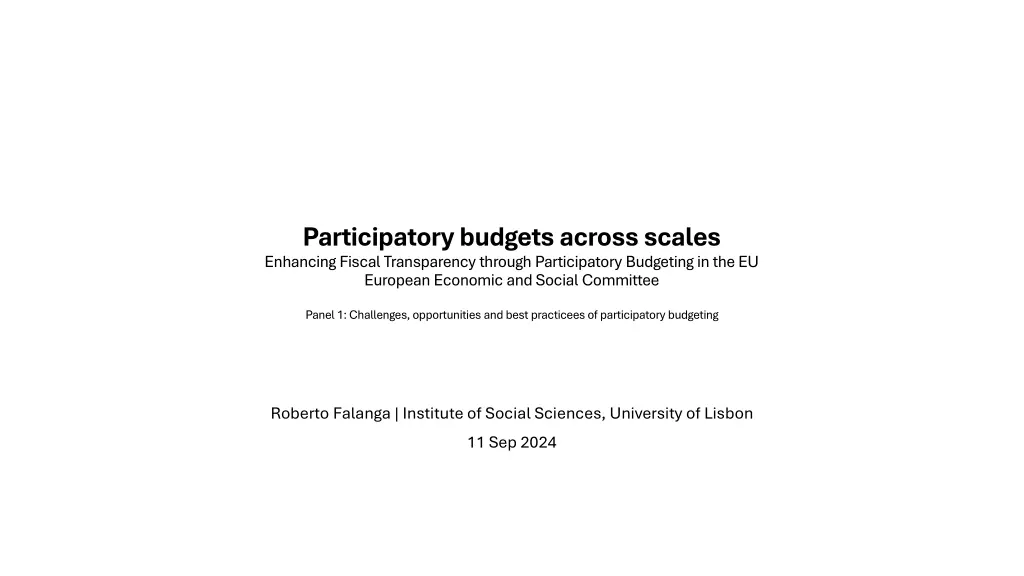
Enhancing Fiscal Transparency through Participatory Budgeting in the EU
"Explore the importance of fiscal transparency in public management and democratic accountability through participatory budgeting. Learn about challenges, opportunities, and best practices identified in the European Economic and Social Committee panel discussion. Discover how participatory budgeting in Portugal at various governance levels influences citizen engagement and public spending efficiency."
Download Presentation

Please find below an Image/Link to download the presentation.
The content on the website is provided AS IS for your information and personal use only. It may not be sold, licensed, or shared on other websites without obtaining consent from the author. If you encounter any issues during the download, it is possible that the publisher has removed the file from their server.
You are allowed to download the files provided on this website for personal or commercial use, subject to the condition that they are used lawfully. All files are the property of their respective owners.
The content on the website is provided AS IS for your information and personal use only. It may not be sold, licensed, or shared on other websites without obtaining consent from the author.
E N D
Presentation Transcript
Participatorybudgets acrossscales Enhancing Fiscal Transparency through Participatory Budgeting in the EU European Economic and Social Committee Panel1: Challenges, opportunities and best practiceesofparticipatory budgeting Roberto Falanga | Institute of Social Sciences, University of Lisbon 11 Sep 2024
Transparencyandparticipatorybudgeting Fiscal transparency is central to public management and democratic accountability through the disclosure of financial information including budgetary data Access to and understanding of clear and comprehensive information, plus creation of shared meanings within the wide public - focus on marginal groups Participatory budgeting can meet goals of transparency as a democratic innovation i.e., by improving democratic values and governance Citizens access information and decide how to allocate a share of the budget; Collective decisions are made through voting; Public funds are spent in line with citizens preferences.
Trade-offs Several agencies advocate for more transparency in PBs via: More effective use of public resources More public trust towards political institutions More support for awareness in wide society More training for civil servants The Recommendation EC 12/2023 suggests more participation at all levels of governance, but the Open Budget Survey (2023) highlights insufficient legislative frameworks and oversight mechanisms for fiscal transparency and participatory budgeting across the EU A blindspot blindspot remains on why participatory budgeting delivers relatively little
PBsin Portugal Portugal has implemented PBs at the three main levels of governance: municipal, regional, and national. The dissemination started in the early 2000s, peaked in in the 2010s and decreased after the pandemic Along with diverse territorial scopes, Portuguese PBs have embraced thematic (e.g., environmental) and actor-oriented approaches (e.g., youth)
PBsonmultiplescales PBs on local, regional, and national levels have communicated littlewith each other. Implications on: Processes: overlapping remits and constituencies perceived inefficiency of public spending citizenfatigue Outcomes: low rate of projects implementation mistrusttowards public authorities regardless of thelevel of governance The implementation of PBs on multiple scales barely met the dynamic, often messy, relations among different levels of governance Time to open a shared reflection on the connections among multiple scales by looking through levels of governance
RegulatingPBsacrossscales It is worth recognising the various levels of governance intercepted by PBs, from local to EU level Need to acknowledge the implications for fiscal transparency A regulation of PBs that approaches multiple scales for transparent and accessible information More evaluation for a more transparency and a stronger feedback loop (OECD, 2023)
EvaluatingPBs PBs need to be overseen and scrutinised to be transparent The debate on monitoring and evaluation needs to go beyond silo-thinkingand embrace the role of PBs withindemocratic systems: PBs can interact with each other across multiplescales within (subsidiarity) and among (knowledge transfer) countries
Foresight Establishing EU-wide standards on PBs and their evaluation can leverage capacity building Cross-border collaboration and knowledge-sharing on PBs in Europe and beyond More knowledge on the trade-offs of PBs when they go beyond the remits of public powers In the future, cross-border collaborations among public authorities and other stakeholders should incorporate a transcalar lens
Thank you! roberto.falanga@ics.ulisboa.pt






















